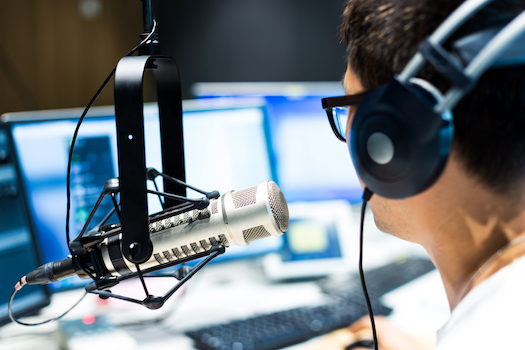Radio Tomorrow with James Cridland
There’s nothing more enjoyable than doing live radio.
There’s the adrenaline of knowing that what you’re saying is going straight into your listeners’ ears: no filter, no second-chances. Fluff a little, and you’ve got to just plough on regardless.
There’s a thrill – if you can do it – of off-air monitoring in your headphones: the effect of the Optimod on your voice, particularly the crackle and distortion of AM. After the microphone processor and the transmission chain, you sound awesome.
Live radio is almost like Russian Roulette. You’re never quite sure whether the caller is going to drop an f-bomb; whether you’re going to get the next segue ‘just right’; or whether the sports journos have slipped in Everton player Gylfi Sigurðsson for a laugh. It’s all seat of the pants stuff.
A fluff here, a mis-pressed button there, a presenter break that could have been better if you’d had another go – it’s all just fine. It’s live radio. And, as we’re told, live radio is what makes radio great.
Except.
Do you truly believe that every time you open your mouth and talk, you get everything perfect? Every single time? Or could you benefit from a little post-production?
If you could have made that segue astonishingly good by pre-recording it and properly beat-matching the songs, for example, why didn’t you?
Would that dull interview with the man from the Council be made slightly better if you had pre-recorded it first, and edited out his ums and errs – and that crappy question you asked that didn’t really go anywhere?
Was your show enhanced with you saying “aaand the travel’s next!” just so you could hit the vocals, or could you have just slid the song back two seconds in playout?
Why is it that The Daily, for example, sounds so much better than your morning news program? Is it because it’s post-produced to make it sound great?
Why are you content to give your listener second-best?
Radio is all about being real and relevant to your audience. So, of course, I’m not encouraging you to voice-track shows more than 12 hours in advance – how can you know what’ll happen, or be able to judge the mood?
And to be clear, I’m wanting you to be in the studio while your show is on – because I do want you to be able to be live if you need to be.
But I’m also encouraging you to think about how much really needs to be live. If you had to justify every live element you wanted to do, what reasons would you give?
Listeners have so many choices these days. A slickly pre-produced program, or podcast, will always sound better than leaving it up to luck.
And, of course, if you pre-record segments, you can do other things with them on other platforms where live and linear is even less relevant than it is now.
Practicing, pre-recording, editing, polishing, and preparing great audio obviously takes time. It’s tempting just to do it all live.
But, as I hope I’ve demonstrated, live radio is lazy radio – at least, it can be. Does your audience deserve better?
About The Author
James Cridland, the radio futurologist, is a conference speaker, writer and consultant. He runs the media information website media.info and helps organise the yearly Next Radio conference. He also publishes podnews.net, a daily briefing on podcasting and on-demand, and writes a weekly international radio trends newsletter, at james.crid.land.
Contact James at [email protected] or @jamescridland


For me as a listener - I much prefer listening to a live show on the radio. I enjoyed John Peel much less on the few occasions when he wasn't live and there were none of those classic John Peel moments., and you could ALWAYS tell the difference - the pre-recorded shows just seemed to lack "life"
As a broadcaster - sometimes you have to pre-record and edit a show - for example when you are presenting highlights from a recent live event. But the temptation is to over produce and polish - which I believe is just not actually appreciated by most listeners...... I would be interested in other thoughts (from a listener POV!)
Don't quite agree James. Live radio or TV is what makes listening/viewing interesting but perhaps Live + polished inserts - a la Kenny Everett - might be a good way to go?!
Obviously this guy doesn't understand live radio.
Sure certain bits are better produced ... interviews, comedy bits ... but live radio is real radio. Voice-tracking is lazy. But it takes a real radio person to be able to do it live, consistently.
I ceased being on Radio at end of 2017 (for a while anyway)
and the biggest gripe I always heard is about half half the shows, especially before midnight, being automated, people want REAL radio, with music and real announcers, not some pre recorded playout garbage else as some put it "might as well avoid commercials and load the mp3 player on shuffle" <-- that always stuck with me, because he had a point, a valid point. Oh and in relation to "presenter break that could have been better" Thats why Gun 'n Roses gave us November Rain, Meatloaf Bat Out Of Hell, Led Zep Stairway To Heaven, Stevie gave us Evie, and I could go on. We're never going to be perfect, thats the human way, and many people seem to enjoy that.